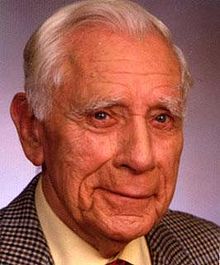- Milivoj Ašner
-
Milivoj Ašner 
Born 21 April 1913
Daruvar, Kingdom of Croatia-Slavonia, Austria-HungaryDied 14 June 2011 (aged 98)
Klagenfurt, AustriaResidence Croatia, Austria Other names Georg Aschner Ethnicity Croat Citizenship Croatian Occupation Policeman Years active 1941-1945 Criminal charge Accused for the deaths of hundreds of Serbs, Jews and Romani people Milivoj Ašner (21 April 1913 – 14 June 2011) was a police chief in the Independent State of Croatia who was accused for enforcing racist laws under its Nazi-allied Ustaše regime and murdering around three thousand Serbs, Jews and Roma. He was born in Daruvar, Kingdom of Croatia-Slavonia and resided in Austria at the time of his death in 2011.
Contents
Post war flight
Ašner fled to Austria at the end of the war in 1945 and adopted the name George Aschner.
Efforts to prosecute
In 2005, Croatia indicted Ašner for crimes against humanity[1] and war crimes in the city of Požega in 1941-42. In February 2006, Austrian judicial officials said they were close to deciding on whether to arrest Ašner. Austrian officials initially ruled he could not be handed over to Croatian authorities as he held Austrian citizenship.[1] However, subsequent investigations by the state attorney's office in the province of Carinthia revealed that he no longer held citizenship in Austria.[citation needed]
He remained on Interpol's most wanted list,[2] and was considered by the Simon Wiesenthal Center as the fourth most wanted Nazi at large.[3][4]
In June 2008, journalists reported that, despite the Austrian government's claims that he was in poor health, he appeared to be physically fit based on his presence at a European Championship football match involving Croatia in Klagenfurt, where he lived.[5] This prompted renewed calls for his extradition to Croatia.[6]
The controversial then Governor of Carinthia, Jörg Haider, praised Ašner's family as friendly and said of Ašner that "he's lived peacefully among us for years, and he should be able to live out the twilight of his life with us". This provoked further criticism, with Efraim Zuroff of the Simon Wiesenthal Center saying that Haider's views reflected "the political atmosphere which exists in Austria and which in certain circles is extremely sympathetic to suspected Nazi war criminals".[1]
Denial of involvement
In an interview that aired in Croatia on 19 June 2008, Ašner acknowledged that he was involved in deportations, but maintained that those who were deported were taken not to death camps, as is generally believed, but to their homelands instead. He claimed his conscience was clear and that he was willing to go on trial in Croatia, but also asserted that his health was a problem. In an examination in the same week, it was again decided he was mentally unfit. Zuroff expressed the suspicion that Ašner was pretending or exaggerating regarding his condition.[1]
See also
References and external links
- ^ a b c d "Praise for 'treasured' Nazi suspect revives accusations that Austria is sheltering him", Associated Press (International Herald Tribune), 20 June 2008
- ^ Ašner's entry in Interpol Wanted list
- ^ Simon Wiesenthal Center (SWC)'s Annual Report and Most Wanted List, released 30 April 2008; accessed 2008-06-17
- ^ "Fugitive Hunt", Dateline World Jewry, World Jewish Congress, July/August 2008
- ^ Brian Flynn, "We find wanted Nazi at footie", The Sun (UK), 16 June 2008
- ^ "Wiesenthal Center Urges Immediate Extradition of Wanted Nazi Revealed in Good Health in Austria", 16 June 2008
- Holocaust Encyclopedia Entry on Yugoslavia, U.S. Holocaust Memorial Museum website
Post-war flight of Nazi fugitives Fugitives German / Austrian- Ludolf von Alvensleben
- Klaus Barbie
- Alois Brunner
- Adolf Eichmann
- Josef Mengele
- Hermann Michel
- Erich Priebke
- Walter Rauff
- Eduard Roschmann
- Walter Schreiber
- Horst Schumann
- Franz Stangl
- Gustav Wagner
Croatian- Milivoj Ašner
- Ante Pavelić
- Dinko Šakić
- Vjekoslav Vrančić
Other nationalitiesAssistance OrganizationsState involvementOther personsHunters Disputed / dubious See also: AšnerCategories:- 1913 births
- 2011 deaths
- People from Daruvar
- Ustaše
- Fugitives wanted on crimes against humanity charges
- Fugitives wanted on war crimes charges
- Fugitives wanted by Croatia
- The Holocaust in Croatia
- Holocaust perpetrators
- Collaboration during World War II
- Collaborators with Nazi Germany
- Croatian Nazi collaborators
- Independent State of Croatia
- Croatian people of World War II
- Croatian expatriates in Austria
- Disease-related deaths in Austria
Wikimedia Foundation. 2010.
